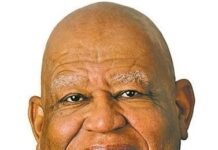 Decades of research has shown that academic achievement in college — measured by one’s GPA — is a function of pre-college preparation, study skills, and highly correlated with students’ college entrance examination scores, even for Black men. These precollege academic factors account for approximately 25 percent of differences in students’ GPAs in college. But other factors play a role.
Decades of research has shown that academic achievement in college — measured by one’s GPA — is a function of pre-college preparation, study skills, and highly correlated with students’ college entrance examination scores, even for Black men. These precollege academic factors account for approximately 25 percent of differences in students’ GPAs in college. But other factors play a role.
A new study conducted by Terrell Strayhorn of The Ohio State University provides critical insights about these factors. His study tests the importance of a noncognitive trait, grit, to predicting grades for a sample of Black males attending a predominantly White institution. Grit is defined by the Merriam-Webster Dictionary as “firmness of mind or spirit : unyielding courage in the face of hardship or danger.”
A survey asked students about their demographic backgrounds, precollege academic histories, transition experiences, and included an empirically-tested grit scale. Survey data were merged with students’ academic records to include the male students’ ACT or SAT scores, high school GPAs, and current GPAs in college. Using multivariate statistics and hierarchical regression models, Professor Strayhorn found that background traits, academic factors, and grit explain approximately 24 percent of the variance in college GPA for Black males at the predominantly White university. Grit, alone, added incremental predictive validity over and beyond traditional measures of precollege academic success. In other words, grittier Black males earned significantly higher GPAs in college than their less gritty peers.
The implications of Strayhorn’s new study are many. In the article, Dr. Strayhorn concluded, “Academic advisors and parents might consider these results when working with [young men]. Encouraging Black males to apply themselves, exert more effort, and persevere despite setbacks seems just as important as emphasizing previous grades and test scores.” Results also provide helpful information to program staff and student affairs professionals. Strayhorn noted, “Parents and mentors of Black boys should talk with their sons about the importance of hard work and perseverance, dispelling myths about ‘natural talent’ or ‘sheer genius’.” Simply put, Black males who exert more grit in college than their peers earn better grades.
Professor Strayhorn’s new study titled, “What Role Does Grit Play in the Academic Success of Black Male Collegians at Predominantly White Institutions?,” has been published in January 2013 edition of the Journal of African American Studies. The article may be accessed here.
Dr. Strayhorn is an associate professor in the College of Education and Human Ecology at The Ohio State University, where he also holds appointments in African American and Africana studies, sexuality studies, and engineering education. He also directs the Research Group for Higher Education Research and Policy (CHERP).
Professor Strayhorn is a graduate of the University of Virginia. He holds a master’s degree from the Curry School of Education at the University of Virginia and an educational doctorate from Virginia Tech.











How exactly does one measure “grit?”
Hi Mike-
Thats what I was thinking too. Does one come out of the womb with it or is it an acquired taste?
I think that “grit” is a learned behavior. Family and those who came before us play a major role in developing “grit’
I think Dr. Strayhorn’s research has a great deal of merit. I would be interested in knowing is this ‘grit’ measured by item responses on a survey and whether there are any statistical differences between those who indicate higher levels of ‘grit’ differ from those black mnale students who attend HBCU’s. This type of research could shed light on whether the level of resolve is different based on different types of environments. Another question I would have is whether there are differences between males and females in terms of this ‘grit’, and if so, whether they can be explained by how females are raised versus males (e.g. males are oftentimes raised to work independently and be more self-reliant in navigating educational challenges). This factor may be no different among males regardless of what type of institution they attend. Food for thought.
I advise minority undergraduates. Is it for lack of “grit” that most brothers won’t contact me when they are having academic difficulty?
Having more black men at PWI may help in young brothers developing “grit” and a sense of belonging. But they must be strong black men. PWI have a difficult time in hiring them
Thanks, great to know to continue to guide our high school senior son!